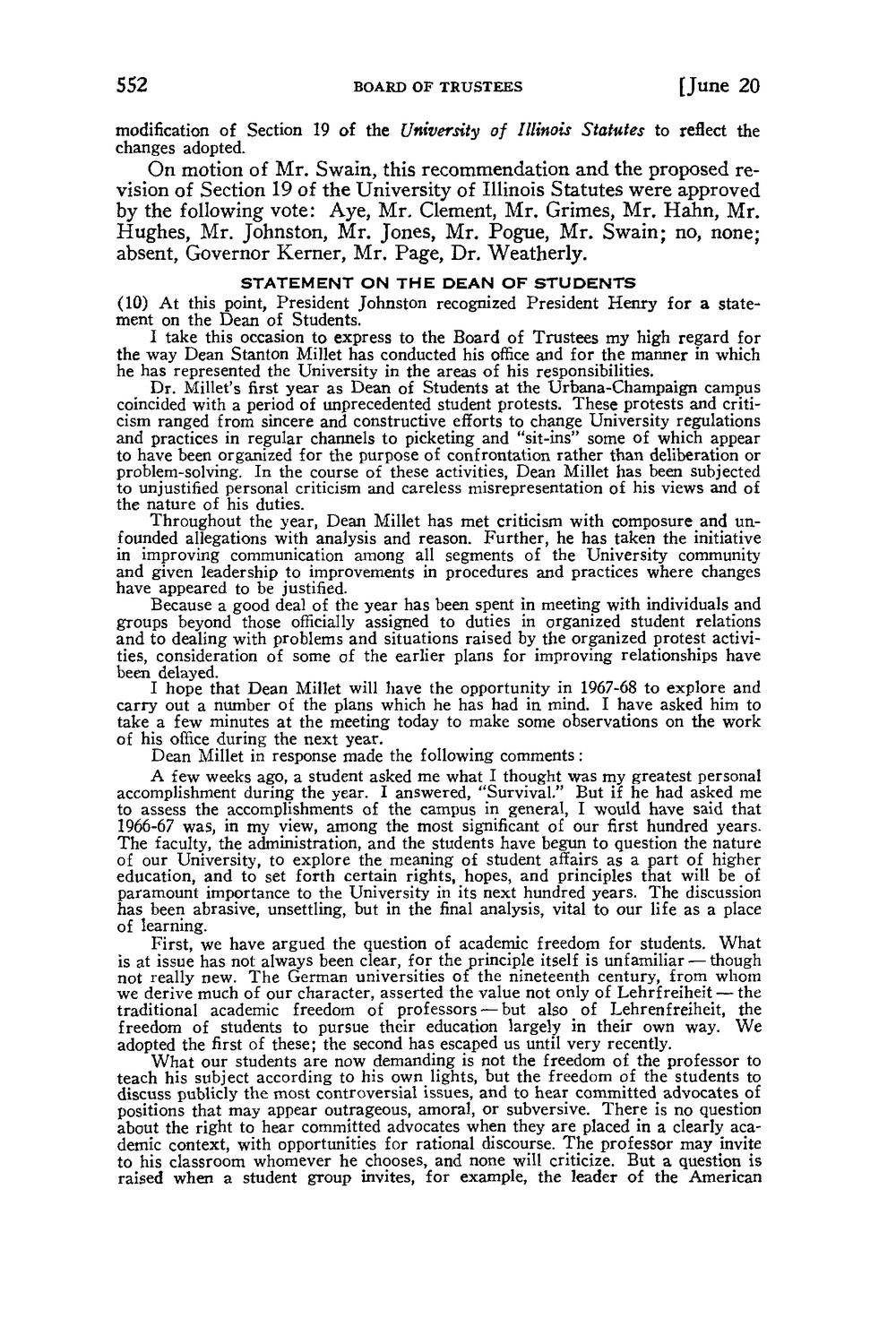| |
| |
Caption: Board of Trustees Minutes - 1968
This is a reduced-resolution page image for fast online browsing.

EXTRACTED TEXT FROM PAGE:
552 BOARD OF TRUSTEES [June 20 modification of Section 19 of the University of Illinois Statutes to reflect the changes adopted. O n m o t i o n of M r . S w a i n , t h i s r e c o m m e n d a t i o n a n d t h e p r o p o s e d r e v i s i o n of S e c t i o n 19 of t h e U n i v e r s i t y of I l l i n o i s S t a t u t e s w e r e a p p r o v e d by the following vote: Aye, M r . Clement, M r . Grimes, M r . H a h n , M r . H u g h e s , M r . Johnston, M r . Jones, M r . P o g u e , M r . S w a i n ; no, none; absent, Governor Kerner, M r . Page, Dr. Weatherly. STATEMENT ON T H E DEAN O F S T U D E N T S (10) At this point, President Johnston recognized President Henry for a statement on the Dean of Students. I take this occasion to express to the Board of Trustees my high regard for the way Dean Stanton Millet has conducted his office and for the manner in which he has represented the University in the areas of his responsibilities. Dr. Millet's first year as Dean of Students at the Urbana-Champaign campus coincided with a period of unprecedented student protests. These protests and criticism ranged from sincere and constructive efforts to change University regulations and practices in regular channels to picketing and "sit-ins" some of which appear to have been organized for the purpose of confrontation rather than deliberation or problem-solving. In the course of these activities, Dean Millet has been subjected to unjustified personal criticism and careless misrepresentation of his views and of the nature of his duties. Throughout the year, Dean Millet has met criticism with composure and unfounded allegations with analysis and reason. Further, he has taken the initiative in improving communication among all segments of the University community and given leadership to improvements in procedures and practices where changes have appeared to be justified. Because a good deal of the year has been spent in meeting with individuals and groups beyond those officially assigned to duties in organized student relations and to dealing with problems and situations raised by the organized protest activities, consideration of some of the earlier plans for improving relationships have been delayed. I hope that Dean Millet will have the opportunity in 1967-68 to explore and carry out a number of the plans which he has had in mind. I have asked him to take a few minutes at the meeting today to make some observations on the work of his office during the next year. Dean Millet in response made the following comments: A few weeks ago, a student asked me what I thought was my greatest personal accomplishment during the year. I answered, "Survival." But if he had asked me to assess the accomplishments of the campus in general, I would have said that 1966-67 was, in my view, among the most significant of our first hundred years. The faculty, the administration, and the students have begun to question the nature of our University, to explore the meaning of student affairs as a part of higher education, and to set forth certain rights, hopes, and principles that will be of paramount importance to the University in its next hundred years. The discussion has been abrasive, unsettling, but in the final analysis, vital to our life as a place of learning. First, we have argued the question of academic freedom for students. What is at issue has not always been clear, for the principle itself is unfamiliar — though not really new. T h e German universities o f the nineteenth century, from whom we derive much of our character, asserted the value not only of Lehrf reiheit — the traditional academic freedom of professors — but also of Lehrenfreiheit, the freedom of students to pursue their education largely in their own way. We adopted the first of these; the second has escaped us until very recently. W h a t our students are now demanding is not the freedom of the professor to teach his subject according to his own lights, but the freedom of the students to discuss publicly the most controversial issues, and to hear committed advocates of positions that may appear outrageous, amoral, or subversive. There is no question about the right to hear committed advocates when they are placed in a clearly academic context, with opportunities for rational discourse. The professor may invite to his classroom whomever he chooses, and none will criticize. But a question is raised when a student group invites, for example, the leader of the American
| |